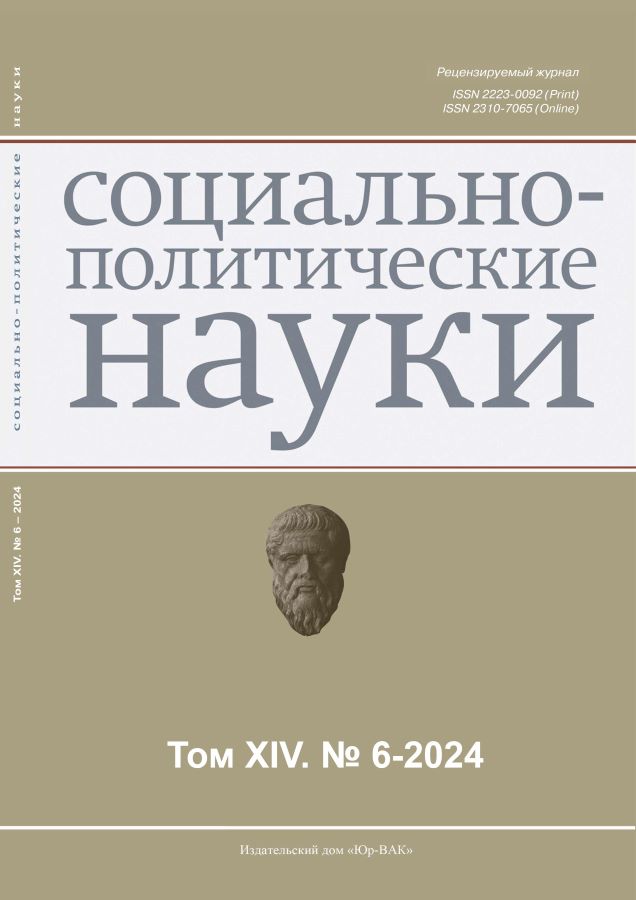How films about artificial intelligence influence the attitude of metropolitan residents towards smart city technologies
- Authors: Garaganov A.V.1
-
Affiliations:
- Financial University under the Government of the Russian Federation
- Issue: Vol 14, No 6 (2024)
- Pages: 203-209
- Section: Sociology of management
- URL: https://journals.eco-vector.com/2223-0092/article/view/654094
- DOI: https://doi.org/10.33693/2223-0092-2024-14-6-203-209
- EDN: https://elibrary.ru/EZKPLC
- ID: 654094
Cite item
Abstract
The article explores the historical development of artificial intelligence (AI) from the first technical developments to modern neural networks, analyzing its reflection in culture and cinema. The evolution of public perception is also considered through the prism of works of art, starting with mythological plots and ending with modern films. Based on the analysis of 58 popular films, four basic ideas about AI in the minds of residents of megacities have been identified: anthropomorphic robots (36.2%), intelligent systems (29.3%), technologically advanced humans (24.1%) and animated images (10.3%). Special attention is paid to the role of cinema in shaping public opinion about intelligent technologies and their impact on the development of a digital society. The study demonstrates the relationship between cultural perception of AI and real technological progress.
Keywords
Full Text
About the authors
Artur V. Garaganov
Financial University under the Government of the Russian Federation
Author for correspondence.
Email: arturcompany21@gmail.com
researcher, Center “Locomotives of Growth”, Department of Sociology
Russian Federation, MoscowReferences
- Shtompka P. Sociology. Analysis of modern society. S.M. Chervonnaya (transl. from Polish). Moscow: Logos, 2005. 664 p.
- Hosking J. Trust: A story. P.S. Bavina et al. (transl. from English). Moscow: Political Encyclopedia, 2016. 294 p.
- Twenge D. Generation I. Why the Internet generation has lost its rebellious spirit, has become more tolerant, less happy and absolutely not ready for adulthood. A. Tolmacheva (transl. from English). Moscow: RIPOLL Classic Group of Companies, 2019. 406 p.
- Onipko A.A. Educational needs and trajectories of modern youth. Discussion. 2013. No. 2 (32). Pp. 64–67. (In Rus.). EDN: OHWJUM.
- Litovchin Yu.M. Leading paradigms of research on directing television advertising. Science of Television. 2016. Vol. 12. No. 3. Pp. 64–80. (In Rus.). EDN: XINBDL.
- Pavlov A.V. Images of modernity in the XXI century: Post-postmodernism. Personality. Culture. Society. 2019. Vol. 21. No. 1–2 (101–102). Pp. 53–62. (In Rus.). doi: 10.30936/1606-951X-2019-21-1/2-53-62. EDN: TVTYJN.
- Garaganov A.V. The practice of managing a social role in a smart city on the example of marketplaces. Sociopolitical Sciences. 2024. Vol. 14. No. 4. Pp. 177–185. (In Rus.). doi: 10.33693/2223-0092-2024-14-4-177-185. EDN: PFLPTK.
- Garaganov A.V. Cinematography as a mirror of urbanization: A socio-psychological analysis of the representation of smart cities in modern cinema. Problems of Economics and Legal Practice. 2024. Vol. 20. No. 5. Pp. 284–290. (In Rus.). doi: 10.33693/2541-8025-2024-20-5-284-290. EDN: WARVDK.
- Garaganov A.V. The technique of “role installation” as a psychological and pedagogical tool for the development of professional skills of film actors. Bulletin of the State University. 2024. No. 4. Pp. 140–155. (In Rus.). EDN: GQKJBJ.
- Pavlov A.V. Tell your children: One hundred and twenty-three experiences about cult cinema. 3rd ed., reprint. and add. Moscow: Publishing House of the Higher School of Economics, 2020 584 p.
- Bakhteev D.V. Artificial intelligence: Ethical and legal foundations. Monograph. Moscow: Prospekt, 2023. 176 p.
- Srnichek N. Capitalism of Platforms. M. Dobryakova (transl. from English and scien.). Moscow: Publishing House of the Higher School of Economics, 2020. 128.
- Paul K. Digital Art. Moscow: Ad Marginem Press, 2017. 272 p.
- Fan Sh. Will artificial intelligence replace us? Moscow: Ad Marginem Press, ABC Design, 2019. 144 p.
- Lovink G. Critical theory of the Internet. Moscow: Ad Marginem Press, Garage Museum of Modern Art, 2019. 304 p.
- Bryukhonenko S.S., Chechulin S.I. Experiments on isolating the dog’s head (with a demonstration of the device). In: Proceedings of the II All-Union Congress of Physiologists. Leningrad, 1926. Pp. 289–290.
- Vershinina I.A. Cultural heritage in urban space. In: Russian society today: Values, institutions, processes. Materials of the All-Russian Scientific Conference (St. Petersburg, November 16–18, 2023). St. Petersburg: Scentia Publishing House, LLC, 2023. Pp. 1070–1073. EDN: DDBFUQ.
- Osawa H., Hase S., Miyamoto D. et al. The influence of science fiction on ideas about the future of artificial intelligence. Technologos. 2020. No. 2. Pp. 42–52. (In Rus.). doi: 10.15593/perm.kipf/2020.2.04. EDN: IHBMCR.
- Vereshchagina N.V. Robots, artificial intelligence, the rise of machines: The mythology of NTR and science fiction. Technologos. 2016. No. 3. (In Rus.)
- Degtyarenko K.A., Pchelkina D.S., Shpak A.A., Pimenova N.N. The image of artificial intelligence in cinema: transformations in the period of 1980–2010. SFU Journal. Humanities. 2023. No. 8. (In Rus.)
- Martynenko T.S. Cinema as a subject of sociological analysis: Features of modern cinema. Bulletin of the Moscow University. Series 18: Sociology and Political Science. 2023. No. 2. (In Rus.)
- Garaganov A.V. An innovative approach in the social management of film production: The method of “role installation”. Sociopolitical Sciences. 2024. Vol. 14. No. 5. Pp. 173–178. (In Rus.). doi: 10.33693/2223-0092-2024-14-5-173-178. EDN: SJJOIO.
Supplementary files









